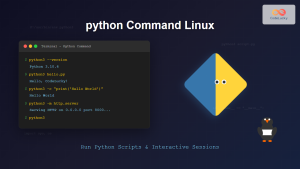The exec() function in Python is a powerful tool that allows you to execute arbitrary Python code at runtime. This dynamic execution capability opens up possibilities for creating flexible and adaptable applications. Let's dive into the details of how exec() works, explore its use cases, and understand its potential pitfalls.
Understanding the Power of exec()
Imagine you're building an application where users can define custom calculations or modify the application's behavior through input. The exec() function empowers you to handle such dynamic scenarios. It lets you execute Python code stored in strings or files, extending your application's functionality beyond its initial design.
Syntax and Parameters
The exec() function takes a single argument, which can be:
- A string: Containing Python code to be executed.
- A file object: Representing a file containing Python code.
exec(object[, globals[, locals]])
- object: (Required) The Python code to execute. It can be a string or a file object.
- globals: (Optional) A dictionary representing the global namespace where the code should execute. By default, it uses the current global namespace.
- locals: (Optional) A dictionary representing the local namespace where the code should execute. By default, it uses the current local namespace.
Executing Code from Strings
Let's begin with the most common use case: executing code stored in strings.
Example 1: Basic Code Execution
code = "print('Hello from the exec() function!')"
exec(code)
Output:
Hello from the exec() function!
In this example, the string code holds the Python code print('Hello from the exec() function!'). The exec() function interprets this code and executes it, producing the expected output.
Example 2: Defining and Using Variables
code = "x = 10\ny = 20\nprint(x + y)"
exec(code)
Output:
30
Here, the code string defines variables x and y and performs a simple calculation. The exec() function executes the code, creating the variables within its own scope and printing the result.
Executing Code from Files
The exec() function can also execute code from files.
Example 3: Executing Code from a File
my_script.py:
print("This code is being executed from a file!")
with open("my_script.py", "r") as file:
code = file.read()
exec(code)
Output:
This code is being executed from a file!
This example opens the my_script.py file, reads its contents, and executes the code using exec().
Modifying the Execution Environment
The globals and locals parameters provide flexibility in controlling the execution environment.
Example 4: Using Custom Global Namespace
globals_dict = {"a": 1, "b": 2}
code = "print(a + b)"
exec(code, globals_dict)
Output:
3
This example defines a custom global namespace using the globals_dict dictionary. The exec() function executes the code within this custom namespace, accessing the variables a and b defined within it.
Example 5: Using Custom Local Namespace
locals_dict = {"a": 1, "b": 2}
code = "print(a + b)"
exec(code, None, locals_dict)
Output:
3
This example demonstrates the use of a custom local namespace. The exec() function executes the code within the locals_dict environment, accessing the variables defined within it.
Important Considerations
- Security: While
exec()is a powerful tool, it introduces security risks if you're executing code from untrusted sources. Never execute arbitrary code from users without proper validation and sanitization. - Scope: Be mindful of variable scopes. Variables defined within
exec()might not be accessible in the surrounding code, and vice versa. - Error Handling: Wrap
exec()calls intry-exceptblocks to handle potential errors gracefully. - Performance:
exec()involves dynamic code execution, which can be slower than executing static code. For performance-critical scenarios, consider alternative approaches.
Wrapping Up
The exec() function in Python provides the ability to execute Python code dynamically. It's valuable for creating dynamic and flexible applications. Remember to use exec() responsibly and consider the potential security implications, scope issues, and performance considerations. With careful use, exec() can be a powerful tool in your Python development arsenal.



